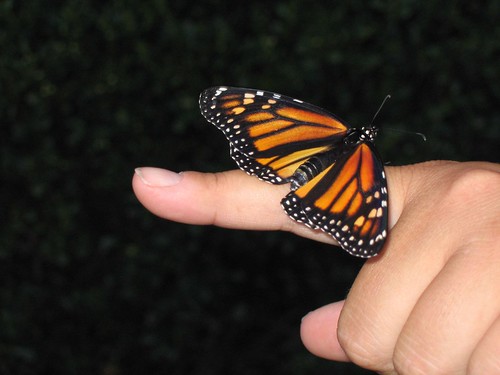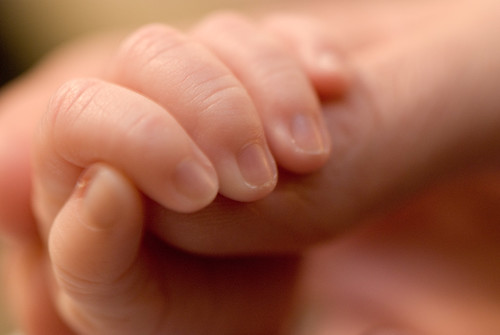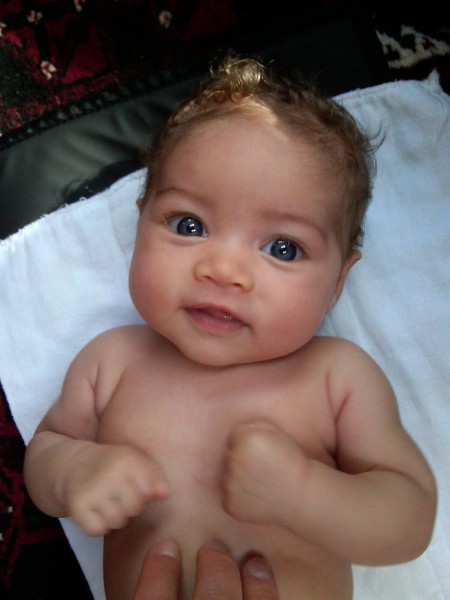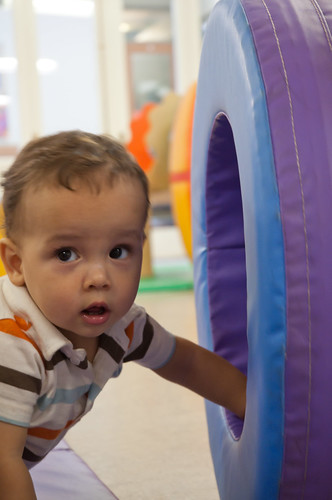I’ve been contemplating these words from Janet Lansbury for days now, as J., who will turn three years old in less than two weeks, has been growing in leaps and bounds right before our very eyes:
In regard to babies and loss…. Even if we never, ever leave our baby’s side, s/he will experience loss. Leaving the womb is “loss”. Anytime the child grows, accomplishes, becomes a little more independent, there is loss involved. Weaning and toilet learning are losses, even if the child leads the way. When the baby wants mommy and only daddy is available to her, that is loss. Loss is a natural, unavoidable part of life, even for babies. But babies aren’t “afraid” of it the way we might be… However, we can teach them to be. Crying is healing when it is supported by loving parents and caregivers. Babies learn something very empowering…”I’m okay”, or “Mommy comes back”.
I am always conscious of the fact that if I am doing my job as an infant/toddler caregiver well, it means that I am providing the baby with both the support and the freedom s/he needs to become ever more independent, but without pushing before the child is ready. Babies and toddlers grow and change so quickly, and even as adults (sometimes anxiously) look forward to “first times”, cheer new accomplishments, and celebrate developmental milestones and birthdays, both babies and adults sometimes struggle with the feelings of loss that inevitably accompany growth, change, and new achievements. While there can’t be growth without loss, I can’t help but feel that in order to truly embrace the “new” and the “now”, we need to acknowledge (not get stuck in, but just take a moment to contemplate and honor) what once was, what we are letting go of the baby that once was, the relationship that once was- and is now changing. If we can accept all of the sometimes conflicting emotions that come up (for both children and grown-ups) as we and they move through stages and ages, maybe we can move through them with a little more ease.
If nothing ever changed, there’d be no butterflies. ~Author Unknown
At the end of last week, J. began attending a play based preschool program for three hours each morning (the same one his sister attended starting when she was 40 months old, and J. was just a newborn baby). He is so excited, proud, and happy to be going to what he calls “my school” (just like his big sister). So far, his adjustment has been going smoothly. There have been a few tears in the morning when his Mom and Dad drop him off, but he quickly calms down and enthusiastically joins in the play. “I cried, because I didn’t want Mommy and Daddy to go. But only a little bit.”
When I arrive to pick J. up, I usually find him hanging from the monkey bars, and he’s eager to show me the new tricks he’s been practicing after he leaps into my arms for a hug. On our drive home, he is full of stories about what he did that day, and the fun he had with his “new best friend” C. It’s clear he’s so ready for this experience. His teachers have remarked on his “delightful sense of humor,” and his “impressive ability to communicate and express his wants, needs, and emotions clearly,” both to them and his peers.
Yet, the very first day, although he played happily all morning, J. was a bit reluctant to allow the teachers to help him when it came time to change his diaper. He told them, “No fank (thank) you. I’m just going to wait for Lisa. She’ll come and take care of me, and change my diaper.” My eyes welled up with tears when I heard this story. Magda Gerber taught that caregiving times (diapering, feeding, bathing) are relationship building times. She urged adults to slow down and bring full focus and attention to the child during these times, and to include the baby fully in the process. When done Magda’s way, diaper changes are intimate, connected, “together”, enjoyable times between caregiver and baby.
As Janet Lansbury says in How to Love A Diaper Change, “Diapering is not just about getting a job done, or having a clean baby. Our hands are a baby’s introduction to the world. If they touch slowly, gently, and “ask” a child for cooperation rather than demand it, we are rewarded with a relationship bound in trust, respect and the inexorable knowledge of our importance to each other.” To me, J.’s response to his teacher spoke to the close, trusting relationship we had forged over three years of daily diaper changes.
Yesterday afternoon, J. accomplished another big milestone. While I was in the kitchen putting away the dishes, and his sister was in the living room reading a book, J. took it upon himself to use the small potty that’s been sitting in the bathroom since he’s been about two years old. He called to me to help him put his diaper back on after he’d finished pooping. Today, his Mom told me that he called to her at about five this morning, telling her he had to use the potty (despite the fact that he had already wet through his diaper in his sleep). He remained dry during his two hour nap time today though, and used the potty without any prompting from me when I helped undress him for his bath after we picked his sister up from school. It seems he is on his way to mastering toilet learning on his own terms.
Yet, last weekend, as his parents cleaned out the garage to prepare for a yard sale, J. enjoyed revisiting and playing with some of the baby toys he had long outgrown. I sat to watch him play for a bit, when suddenly he lifted his arms and asked me to pick him up. When I did, he said, “Lisa, I want to be a baby and a big boy too.” I nuzzled him and told him I understood.
I do understand, because even as I experience a feeling of joy as I watch J. confidently move into the wider world outside of the close circle of his family, while nonchalantly tackling the task of potty learning, I’ve found myself feeling a little at loose ends this week. There is a slight sadness and sense of nostalgia for the baby boy and young toddler that I have spent the last three years helping to nurture to this place of confidence and independence. We still have a close bond and we share our afternoons together, but he needs me in a different way than he used to. I am missing J.’s company and our mornings together, with all the easy, intimate rhythms and routines we shared, even as I delight in watching him grow and spread his wings to become exactly who he is today, and I revel in the fact that I have gained fifteen free hours every week to devote to walking and yoga, writing, volunteering, wedding planning, and (finally!) staring a parent/infant class.
It can be bittersweet, this letting go and saying goodbye to what was, even as we make way for what’s becoming, can’t it?



